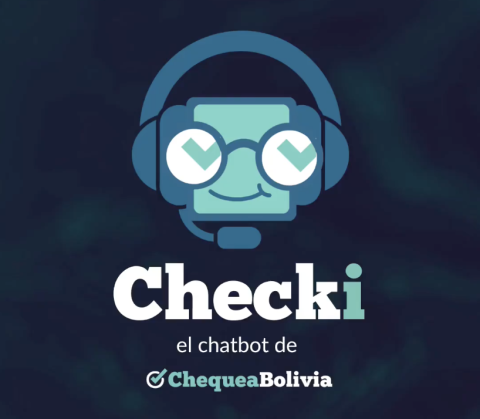
Journalists and developers at ChequeaBolivia have created and launched Checki, a chatbot that uses multimedia content and games to fight misinformation among young people. This project was led by Lucas Illanes and supported by the International Center for Journalists (ICFJ). Paola Céspedes served as developer, Enid López as editor, Yirleyn Montaño as media literacy specialist, Sara Villanueva as outreach coordinator, and Juan Carlos Uribe as project coordinator.
Illanes, based in Bolivia, launched this project with a grant from ICFJ’s Disarming Disinformation initiative, a three-year global effort supported by the Scripps Howard Fund. He was one of 18 people from around the world who received training and funding through the program to test innovative ways of distributing the truth to counteract the spread of misinformation.
Illanes and his team spent over a month developing their initial framework. This included building a database, establishing a visual identity for the chatbot, and performing language testing before they launched their prototype in July. Their team overcame significant obstacles in the production and development of the chatbot, including several rejected API requests and having to learn an entirely new coding language. The final product was an interactive chatbot centered on games meant to train the user on fact-checking and verification through several levels of increasing complexity. The levels include games on how to identify misinformation, avoid scams on WhatsApp, verify images, conduct searches for accurate information, and quizzes on verification strategies.
Illanes and his team employed a diverse distribution and promotion strategy, using every major social media platform in coordination with in-person events. They published over 60 promotional posts on social media and partnered with Damian Paulus, an up-and-coming Bolivian influencer, to produce videos. However, over the course of the project, they determined that social media was the least effective in garnering interactions and users of the bot, so they pivoted to hold more in-person promotion events. These in-person campaigns generated both more absolute users and a higher percentage of conversions to repeat users.
In August, they held pilot tests in a variety of different locations, including among the Aymara Indigenous community in Cochabamba. The reception among the test attendees was positive and allowed Illanes and his team to continue polishing their chatbot before its final release and distribution in partnership with schools and universities.
As of December 2023, the project had garnered nearly 15,000 unique interactions on ChequeaBolivia’s social media, nearly 20,000 messages sent to the bot, and an average of 24 repeat interactions. The Checki team was also able to determine that over the course of three attempts in just the first level of the chatbot, which features a quiz, users improved their verification skills by an average of 26%.
Ilanes and his team plan to continue to improve the chatbot in 2024, as well as make the bot more sustainable in Bolivia by building more distribution and partnership networks.
Disarming Disinformation is run by ICFJ with lead funding from the Scripps Howard Fund. The three-year project empowers journalists, journalism students, and other media professionals to fight disinformation.